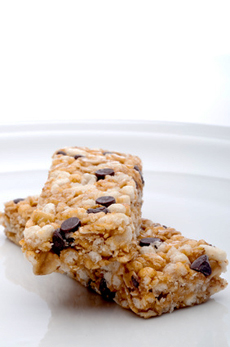

Chocolate lovers can find more than a few granola bars studded with mini chips. Photo © Vince Clements | Fotolia.
STEPHANIE ZONIS focuses on good foods and the people who produce them.
|
October 2009
|
 |
Granola Bars
Page 3: Tasting Methodology & General Findings
This is Page 3 of a seven-section article. Click on the black links below to visit other sections.
Article Index
Tasting Methodology
No more than four bars were sampled at any one testing session. After one bar was sampled, water was sipped and at least five minutes were allowed to elapse before the next bar was tasted. No more than eight bars were tasted in one day, and testing sessions were spaced at least five hours apart.
General Findings
A wide selection of bars were tasted—both supermarket bars and small manufacturer “artisan” bars and custom bars.
- Supermarket granola bars have a “crisp rice” sameness. There was a sameness to most supermarket granola bars. Whether they were crunchy or chewy, they tended toward a light, crisp texture, thanks in large part to the use of something called “crisp rice.” Crisp rice is a combination of rice or rice flour with sugar, salt, malted barley flour and/or one or two other ingredients. It functions as a relatively inexpensive “filler” in bars. In a blind taste-test, I would have been hard-pressed to distinguish one of these bars from another, had all been the identical flavor.
- The granola bars from smaller manufacturers are far more interesting. Their textures vary from moist, chewy and heavy, to light, crisp and dry. Some of the bars from small-scale producers actually contained enough dried fruit to satisfy my tastes, an amazing feat (if you tell me your granola bar contains fruit, it’s going to need a lot of fruit in it to make me happy).
Nutritional Comparison: Supermarket Vs. Artisan Brands
If you’re looking for any kind of direct nutritional comparison between supermarket granola bars and those made by small-scale producers, it may prove impossible.
- Size. Artisan granola bars were of much greater variation in size. Most supermarket bars I tried weigh between 22 and 42 grams each, roughly 0.77 ounces to 1.48 ounces, while those from smaller businesses not infrequently ranged up to 85 grams, or about 3 ounces, apiece.
- Expense. Smaller-scale manufacturers are not required to provide nutrition information on their products. If you produce fewer than 100,000 units of any given food product per year using the same recipe, putting nutrition information on your label or sales literature is voluntary. Having nutritional analyses done is an expensive matter for a new or small company, so many choose to omit such information and use the money to grow the business. By the time they’re selling 100,000 units, they hopefully have the money to do the analysis.
Now, let’s begin our review of the granola bars with an explanation of how we evaluated them.
Go To Page 4: Reviews~Overview

|


